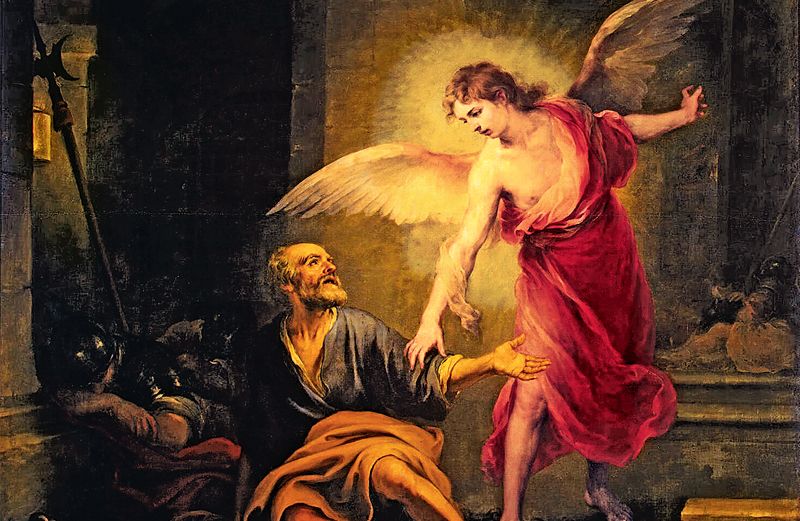Dramatic conversions, daring witnesses, last-minute escapes from prison, tumultuous trips across the sea, survival against the odds–the Book of Acts is full of action, and none of it would have happened without angels at work.
They make an appearance right in the first chapter.
Jesus has just ascended to heaven, the apostles are gathered round, his promise that they will receive the Holy Spirit ringing in their ears, his command that they will be his witnesses “in Jerusalem, in all Judea and Samaria, and to the end of the earth” surely rattling them.
To the end of the earth? How was that possible?
In one of my favorite paintings of that moment, all the apostles can see are Jesus’ wounded feet, their last view of him as he’s lifted up, disappearing in a cloud. You can imagine them staring up, willing him to come back down again.
Amazing things had happened when he was present–healings, casting out of demons, water turned into wine, people walking away from lucrative professions like tax-collecting to follow him. But how could they do any of it with him gone?
The angels, “two men in white robes,” appear out of nowhere to proclaim the God’s honest truth. “Why are you standing here, looking toward heaven?” they ask. “This Jesus, who was taken up from you into heaven, will come in the same way that you saw him go into heaven.”
Meanwhile, there was work to do.
Luke wrote not only the gospel bearing his name, but he was also the author of Acts. The two books should really be read as one, a narrative that starts in Jerusalem with the announcement of John the Baptist’s birth and ends in Rome with Paul’s arrival to preach the good news.
It’s an extraordinary journey from the spiritual center of Judaism to the capital of the Roman Empire. Luke paints his scenes vividly, letting us see the angels from the start, appearing to Zechariah, Elizabeth, Mary, to the shepherds out in the fields grazing their flocks, to the women at the tomb on Easter morn.
Now that the disciples are on their own, their good shepherd gone, the angels will help them.
For instance, look what happens to Peter, thrown into prison for preaching the word at Solomon’s Porch at the temple and healing the sick. No sooner is he under lock and key with the other apostles in a dungeon cell than an angel opens the door at night, leading them out.
It happens to Peter again, seven chapters later. This time it’s Herod who has thrown him into prison. Peter is asleep, chained to two prison guards. The angel appears with a light in the cell and nudges Peter awake. “Quick! Get up!” The chains fall from Peter’s wrists.
“Get dressed,” the angel tells him. “Put on your sandals. Put on your coat and follow me.” Peter makes his way out of the prison, passing two sets of guards, even going through the massive iron gate to the city.
All the while Peter thought he was being led by a vision, a phantom, but once he’s out on the street, he realizes where his help has come from. This was no vision but something real. His chains are gone. He is free.
Luke, mind you, is not only a good storyteller but a historian. He’s setting the record straight, putting events in their historical context. Remember how he starts his account of Jesus’ birth, letting us know who the earthly ruler was at the time, “In those days Caesar Augustus…?”
Now, two generations later, he takes us to Herod’s palace and shows us that Herod Agrippa, the current king, suffers from the same megalomania that led his grandfather to slaughter innocent children in a fit of jealousy at Jesus’ birth.
In the Book of Acts, this Herod seats himself on the throne and proclaims that he is divine. “Immediately,” Luke writes, “an angel from the Lord struck Herod down, because he didn’t give the honor to God. He was eaten by worms and died.”
The same dramatic exit (without mention of the angel) is recorded by Josephus, a contemporary Jewish historian of the era.
Angels have more benign roles in spreading the gospel. The apostle Philip is given instructions on how to reach the Gentiles. “At noon, take the road that leads from Jerusalem to Gaza,” the angel tells Philip.
There he meets a eunuch responsible for a treasure that belongs to the Ethiopian queen. While sitting in his carriage, the eunuch was reading the Book of Isaiah, and Philip approached him and asked, “Do you really understand what you are reading?”
“Without someone to guide me, how could I?”
He then invited Philip to sit with him and teach him, telling him the good news, until they came to some water. “Look! Water! What would keep me from being baptized?” He orders the carriage to halt, and Philip baptizes him. All thanks to an angel’s guidance.
The angels in Acts don’t limit their appearances to apostles. Cornelius is a centurion, a pious Gentile who served Caesar but also gave to the Jewish people. One day he saw an angel in a vision telling him to invite Peter to his house.
The man had no idea who Peter was or what message Peter would bring, but he sent his messengers to Peter’s house.
At the same moment, Peter has experienced his own vision that he is to eat all kinds of four-legged animals, reptiles and wild birds. Peter protests. The food in his vision is impure. The voice speaks to him and explains, “Never consider unclean what God has made pure.”
Typically, for Peter is steadfast but no quick-study, the vision appears three times. Still he struggles to understand.
Then Cornelius’ men appear and tell Peter that an angel directed their master to summon him and hear what he had to say. Together with some of the other believers, he went to Caesarea to Cornelius’ house.
It is an important meeting, Gentile and Jew meet under one roof. The Gospel is not meant for just one people but for all “to the ends of the earth.”
As Peter puts it, “I really am learning that God doesn’t show partiality to one group of people over another.” Or as Paul wrote in his epistle to the Galatians, “There is neither Jew nor Greek; there is neither slave nor free; nor is there male and female, for you are all one in Christ Jesus.”
The true stars of the Book of Acts are the apostles, in particular Peter and Paul, but the angels are the machinery behind them, lending their mystic aid. As the angels promised at Jesus’ birth, praising God and saying in Luke’s gospel, “Glory to God in heaven and on earth peace among those whom he favors.”
No wonder Luke is often depicted in medieval art as a painter. He painted angels with his words.
Download your FREE ebook, Angel Sightings: 7 Inspirational Stories About Heavenly Angels and Everyday Angels on Earth.




